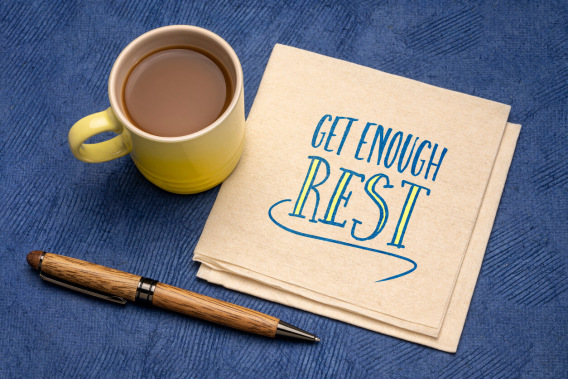10 Health Tips From a Mesothelioma Survivor
Health & WellnessWritten by Michael Cole | Edited By Walter Pacheco

Michael Cole is a long-time pleural mesothelioma survivor and cancer advocate. Cole was diagnosed with mesothelioma in April 2015. Now he spends his time helping others with a similar diagnosis. He works to educate everyone about the dangers of asbestos and shares what’s helped him overcome the odds and survive so long with mesothelioma.
Tips for Those With Mesothelioma
Pain Management
Management of mesothelioma pain can be a real struggle. Getting effective help from medications can be a trial and error thing. My advice is to really work with your care team and rely on pain medication as little as you can. All of the drugs, or at least most of them, have negative side effects over the long run, and many have negative side effects immediately. That said, there are times when you must have them, even really strong ones, with some mesothelioma treatments.
I would advise beginning to wean yourself from pain medication as quickly as you can. At first you may be in agony waiting for the time to take the next round, but as time goes by, that should lessen. Then you can wait a little longer, use less per day, switch to a different med or a lower dose, so on and so forth. Like exercise, you are really the only one who knows what you can do. You can’t leave it entirely to someone else to make those decisions. I found that working with a palliative care team was helpful in sorting out my meds and managing my pain.
Stress
When I was first diagnosed with mesothelioma, a good friend of mine who has cystic fibrosis visited me in the hospital. He said stress would likely be the determiner of how long I lived. Eight-plus years out, I believe he was right. When my stress level is low, my pain is low. My vitals are good. My body “works right.” When I am stressed, even by things that in the past would have hardly bothered me at all, my body goes completely out of whack.
As time has passed this situation is thankfully improving, but it remains a problem. I must make every effort to reduce my chronic stress load and respond properly to life’s circumstances in order to maintain my health. Sometimes it can be difficult to manage the stress. Mesothelioma by itself causes stress, in all kinds of ways. In my experience, I just have to let a lot of it go. Really, most of it. Trust other people. Rest in my faith.

Fatigue
Fatigue seems to be the one constant symptom in all the mesothelioma treatments I have had, ranging from absolutely debilitating much of the time during and after chemotherapy to mild with immunotherapy. Activity seems to be the most effective response to fatigue. Make yourself move. Exercise.
Even engaging your mind in an active way helps. Working puzzles and similar things helped me when I was largely unable to move. For me, every day, every week, can seem like a marathon. I try to pace myself. I do things to give myself a boost at times, like coffee in the afternoon, or maybe taking a nap if I can – whatever it takes to work with what I have and keep going.
Sleep
Getting enough sleep can be a real problem for mesothelioma patients. Pain is, of course, a factor in this problem, and effective pain management is necessary. However, there are other factors that may cause sleep deprivation. In my case, my right lung and a lot of other tissue was removed, including in the diaphragm area. After the surgery I could breathe only in certain positions, and not at all in others.
For example, I could breathe while lying on my back with my shoulders and head elevated to some degree. I could not breathe at all on my stomach or left side. My ability to pull in and expel enough air on my own while sleeping was and still is marginal, at best. After what was really too long a period of time, I was able to get a CPAP machine. The CPAP revolutionized my life! I could hardly believe how much better I felt after I started using it.
Another thing that can affect sleep is an inability to get the mind to settle and stop ”running.” Reducing stress, prayer and meditation can help. If the problem persists, medication may be an answer. As I understand, there are quite a few options, and results vary widely between patients.
Bowel Movements
Bowel movements may be a big problem. Painkillers used to treat the high levels of pain associated with some treatments will often “slow gut action,” causing constipation. Even without the pain medicine, constipation may be a problem.
Drinking enough fluids, exercising and recognizing when bowel movements are not regular and taking action quickly are keys to dealing with constipation. Action may include any number of common over-the-counter remedies, whatever works best for you. A short footstool in front of the commode to lift the feet/knees higher may help the process.
Nutrition
For a person undergoing treatment for mesothelioma, one of the most important and difficult things to do, in my experience, is to eat food and drink enough fluids. It is really a case of making oneself do it, as the “want to” may not be there at all. In fact, because a person who is suffering may not have the strength of will to make themselves do anything, it may very well fall to caretakers to ensure that the patient is eating a healthy diet.
Vitamins and Supplements
Keeping the body as strong and well-supplied with nutrients as possible while undergoing treatment or recovery is important. Vitamins, minerals and other supplements can be a benefit to those living with mesothelioma, but be sure to check with your doctor first. Some dietary supplements can interact with mesothelioma treatments.
Some symptoms and side effects of treatment can be minimized using natural methods. For example, fresh ginger cut into thin slices and boiled in water makes a tea that is a popular method to address nausea. A touch of honey will make it more palatable.
Do your research and consult with the medical staff treating you. It may also be helpful to talk to a dietitian. Bear in mind that too much of anything, even a good thing, can be bad for you, so don’t overdo it on the vitamins and supplements and always inform your physician.

Exercise
Exercise is very important to keeping our strength up and our bodies working correctly. In my experience, it can also be one of the hardest things to do. After my extrapleural pneumonectomy surgery they had me up walking within a very short period of time. It was hard, and I really didn’t want to do it, but they told me if I did not I would die. Not a bad motivator. Since then, my wife has helped motivate me to exercise, even when I do not want to.
It’s worth mentioning that before my illness I was very active and got quite a lot of exercise. The illness and treatments can change that experience. Some of it is mental. Having been healthy and then overnight struggling to just walk 20 feet can be demoralizing. Also, where working out may have made me feel good in the past, it usually just makes me tired now. However, if I don’t get enough exercise, my fatigue will increase, I may have problems with bowel movements, my attitude can be negatively affected and so on.
It’s important to do what you can do without overdoing it, and to always check with your doctor first. If you push too hard at one go you may actually set yourself back because it can, in my experience, take days to get over trying to do too much. You know your own body better than anyone else, and you really have to be the one to draw the lines. Just make sure you are realistic about what you can and cannot do. Push without hurting yourself.
Mental Activity
I believe activity is an important part of our well-being and health. When I speak of activity I am speaking primarily of engaging our minds in a way that may divert our attention from negative stimuli (like pain) and/or give us a sense of pleasure or fulfillment. For the person recovering from surgery or in the throes of chemo, the activity may be very simple and very much for diversion.
I will be honest. Sometimes diversion was just out of reach for me, but when I could focus on something else it helped. In an improved condition, work, hobbies etc. (provided the stress level is low!) can become a big help with this journey.
Attitude
It is crucial to maintain good mental health. A good attitude is perhaps the most important thing of all in your mesothelioma journey. A good attitude relieves stress, which directly helps our bodies function correctly and heal. It helps the people around us, and whether we like it or not, we are dependent upon them for many things that we are not able to do ourselves.
Your attitude is the greatest factor; in fact, it could be said that it is the biggest factor in whether we have the desire to live or not. If a person is diagnosed with mesothelioma, and they have the right attitude toward their circumstances, toward their care team and caregivers, and they have the will to live, that person is a long way toward being a mesothelioma survivor already!
Always be sure to check with your doctor before starting any exercise routine or taking any supplements. Also remember that every person’s journey with mesothelioma is unique, as is everyone’s individual health. These health tips can give those living with mesothelioma an edge over the many negative effects the disease can have on our minds and bodies.






